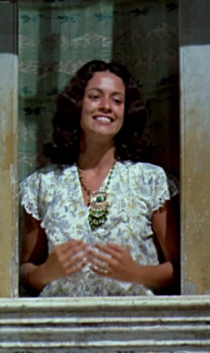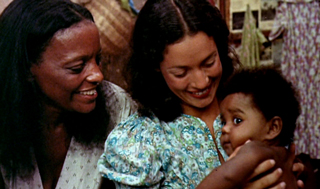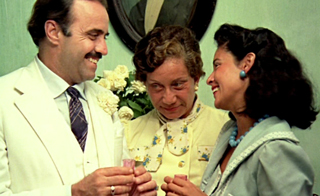
 |
|
|
|
Bruno Barreto's spicy Dona Flor and Her Two Husbands became a big international hit of the late 1970s and made a star of its daring leading actress Sonia Braga. The epitome of Brazilian earthiness, the beautiful and refined Braga upped the standing of sexy stars everywhere. Sex scenes and nudity were as common in the Brazilian cinema as in liberated Italy (think Laura Antonelli), but Braga's class productions stand in a category by themselves. 
The movie was adapted from a popular novel and TV serial by Jorge Amado, a Brazilian writer known for politically progressive, sensual stories, often centering on the provincial town of Bahía. A frequent complaint about film adaptations of Amado's work is that the producers keep the steamy sex angle and drop the politics. Dona Flor is populated by an amusing array of proletarian workers and wastrels, poets and frauds. The young and beautiful Dona Florípides (Sonia Braga) is married to Valdomiro, aka Vadinho (José Wilker), a handsome young rakehell who respects none of society's conventions. Vadinho pretends to be faithful to Dona Flor but spends his nights drinking, gambling and whoring. One night he comes back wearing someone else's coat because he's lost all of his clothes in a card game. Vadinho's debts are legendary but the gamblers and lowlifes love him. Dona Flor suffers humiliations and even beatings. But she ignores her girlfriends' advice to leave her husband because she's still happy -- Vadinho turns her on in bed and she can't live without him. She's somewhat upset that they have no children, though. Responding to gossip, Dona Flor visits a prostitute to find out if the woman's new baby is really Vadinho's. When the issue is cleared up, she's made a fast friend. Dona Flor does have to live without Vadinho, when he unexpectedly drops dead while dancing lewdly in Carnival. After her period of mourning, she's happy to be courted by pharmacist Teodoro Madureira (Mauro Mendoniça), a steady, sober and moral man. But Teodoro is not a great lover and Dona Flor is distracted by the lack of sexual fireworks in her life. Her fantastic solution involves a supernatural return from the grave -- straight to Dona Flor's bed. 
Dona Flor and Her Two Husbands is just the kind of upscale spice art houses thrived on. Intelligent, witty and honest about human relationships, Barreto's movie finds a nice balance between vulgarity and sensuality, skirting the accepted borders of taste with its unabashed softcore nudity. The heavy-breathing Ms. Braga convinces us that sex is the rightful center of all human activity, and does it without lowering her respectability quotient one iota. The Brazilian trappings add flavor to the fantastic sex tale: colorful 1940s costumes (brassiere? what's a brassiere?), crumbling but welcoming houses, lush music and tropical greenery. The Church has a place in all this too. Tricking a priest into investing in a gambling scheme, Vadinho points out the face of a carved angel, which to him looks "lustfully" at a statue of the Virgin Mary. Later, Dona Flor passes through the cathedral and notices the same figurine, and seems to recognize the mischievous eyes of her husband. Sex and morality are not separated in this culture. 
The moral of the story would seem to be that as far as love and happiness are concerned, anything goes. As in later movies by Pedro Almodóvar, woman and men find any number of ways to work out their relationships, which are rarely "fair" by society's standards. The prostitute lives in a crib and sees her lover only infrequently, but she has her healthy baby and feels completely fulfilled. Dona Flor isn't entirely happy with Vadinho but she's also crazy about him; the funeral guests clearly loved the bum. The solution to Dona Flor's limp marriage to the "good" man breaks commandments and defies logic as well as basic decency, but it appears a practical solution. She couldn't be happier. The movie is more of a film blanc than classic Magical Realism. One can't argue with the crazy image of Dona Flor strolling proudly out of church with her "two husbands", the respectable man on one arm and the naked rogue on the other. Sonia Braga went on to play on American screens in Kiss of the Spider Woman. She even made a couple of appearances on Bill Cosby's family-oriented TV show. United Artists' 1983 release Gabriela presented Braga in another Jorge Amado role directed by Bruno Barreto, playing an earthy child bride who marries a Turkish bar owner (Marcello Mastroianni) in Bahíe of old. The film is not a fantasy, but it's almost as steamy as Dona Flor. 1 
New Yorker's Original Director's Cut of Dona Flor and Her Two Husbands is a good-looking enhanced encoding of this spicy favorite. Although colors are subdued and opticals (like the opening shot) are much worse in quality, the movie plays well overall. New Yorker tells us that the version on the disc is uncut, twelve minutes longer than the censored theatrical cut shown in Brazil. As a previous American VHS tape bears the shorter running time, it looks as though fans of this film are likely to be confronted with more erotic content than they remember. The disc carries an original promotional short subject with behind-the-scenes footage of Barreto filming and brief interviews with the stars. A reissue trailer using animated graphics is present as well.
On a scale of Excellent, Good, Fair, and Poor, Footnote: 1. A helpful correction from Carlos Thomaz do Prado Lima Albornoz, February 3, 2009: Mr. Savant, i'm a frequent reader from your column. I'd like to make some little corrections/ tuning on your article about 'our' (Brazilian) movie, Dona Flor and Her Two Husbands. On your article you said that, on his movie adaptations, there was a complaint about poitics being taken into second place. Well, Jorge Amado did it. From his first novels, in the 30's, until the end of the fifties his novels were political pieces (he was an active member of the Communist Party of Brazil), around that time, beginning exactaly with the book Gabriela Cravo e Canela (Gabriella, Clove and Cinnamon, 1958), he began to tell spicy stories with little or no politics involved. His most beloved books (Gabriela, Dona Flor, Tereza Batista, Tieta, Tent of Miracles) were writen from this moment on. So when these books were filmed they reflected what was on them, the politics were not taken to second place on the books, not on film. Hope i am helping you. And, about the Dona Flor television adaptation of the same book: it was done in the nineties, well after the movie. Dona Flor was played by Giulia Gam, an italian descendent blonde girl (with hair dyed to black) which looked nothing like Sonia Braga. Longer (20 one hour chapters) but terrible. You shouldn't try to fix what's not broken. If you have any curiosity about it, it's available on DVD. Maybe the confusion was because Gabriela was a daily soap opera (played at 10PM, so it could be spicy), with Sonia Braga on the lead (and Armando Bogus on the role played by Marcello Mastroianni on the movie), years before it was filmed (and before Dona Flor).
Hope I have helped you anyway. Cheers, as I said before I love your articles. Carlos Thomaz do Prado Lima Albornoz, Brazil
Reviews on the Savant main site have additional credits information and are more likely to be updated and annotated with reader input and graphics.
Review Staff | About DVD Talk | Newsletter Subscribe | Join DVD Talk Forum |
| ||||||||||||||||||